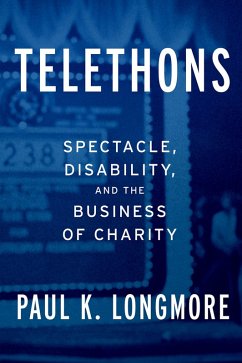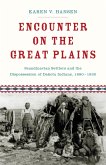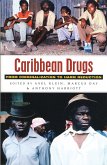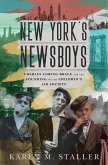Movie stars, entertainers, game-show hosts, jugglers, plate-spinners, gospel choirs, corporate executives posing with over-sized checks, household name-brand products, smiling children in leg braces-all were fixtures of the phenomenon that defined American culture in the second half of the twentieth century: the telethon. Hundreds of millions watched these weekend-long variety shows that raised billions of dollars for disability-related charities. Drawing on over two decades of in-depth research, Telethons trenchantly explores the complexity underneath the campy spectacles. At its center are the disabled children, who, thanks to a particular kind of historical-cultural marginalization, turned out to be ideal tools for promoting corporate interests, privatized healthcare, and class status. Offering a public message about helping these unfortunate victims, telethons perpetuated a misleading image of people with disabilities as helpless, passive, apolitical members of American society. Paul K. Longmore's revelatory chronicle shows how these images in fact helped major corporations increase their bottom lines, while filling gaps in the strange public-private hybrid U.S. health insurance system. Only once disabled people pushed back in public protests did the broader implications for all Americans become clear. Mining insights from great thinkers such as Adam Smith, Edmund Burke, and Alexis de Tocqueville, along with contemporary cultural figures like Jerry Lewis, Ralph Nader, and several disability rights activists, Telethons offers a provocative meditation on big business, American government, popular culture, Cold War values, and "activism" both narrowly and broadly defined. As highly popular entertainment, telethons schooled Americans about how to feel about their bodies, fitness, health, and appropriate ways to interact with people whose bodies did not fit norms determined by advertisers. The programs also taught them about when to weep and how to cure guilt through "conspicuous contribution." Longmore's astute observations about psychology, economics, and society reveal how writing off telethons as kitsch and irrelevant has enabled many individual attitudes, corporate practices, and government policies to go unquestioned. Ultimately, Telethons reveals the passion, humanity, resistance, and triumph that were not center-stage on these popular telecasts by offering insights into the U.S. disability movement past and present.
Dieser Download kann aus rechtlichen Gründen nur mit Rechnungsadresse in A, B, BG, CY, CZ, D, DK, EW, E, FIN, F, GR, HR, H, IRL, I, LT, L, LR, M, NL, PL, P, R, S, SLO, SK ausgeliefert werden.









